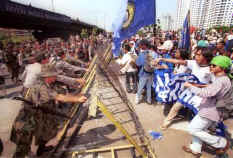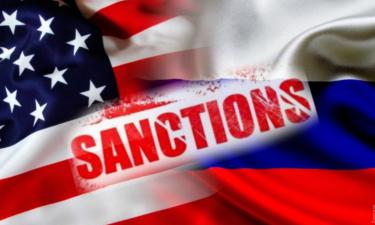Foreign minister is sure East Timor crisis can be resolved
Foreign troops struggled Friday to stave off civil war in East Timor after soldiers gunned down unarmed police in the capital and a mob torched a house filled with children, as the death toll in four days of violence climbed to 23. But in a possible sign that a political solution might be found, the country's foreign minister said he believed the issues that triggered the violence were "still capable of resolution."

"Despite our situation, I have continued to talk to all aggrieved parties in the hope we all can find a lasting, peaceful solution," Jose Ramos Horta said in a statement. Members of the tiny country's 800-member army attacked the national police headquarters Thursday, accusing police of allying themselves with a large band of dismissed soldiers who have engaged in street battles with the military in Dili.
After an hour, U.N. police and military advisers negotiated a cease-fire under which the police were to surrender their weapons and leave the building. But as the unarmed police were being escorted out, "army soldiers opened fire on them," killing 10 and wounding 26 others, according to U.N. spokesman Stephane Dujarric and a local hospital director, who said one died of his injuries overnight.
The unrest in East Timor is the most serious threat to the desperately poor country since it won independence from Indonesia in 1999. The attack on policemen illustrates the dangers facing peacekeepers from Australia, New Zealand, Portugal and Malaysia, the first of whom arrived on Thursday. The United Nations, which spent millions of dollars training East Timor's army and setting up the country, urged the government to take "all necessary steps" to end the violence, which has been fueled by simmering tensions in a nation divided along east-west lines.
Machete-wielding youths were seen stopping a bus on the city's outskirts and asking its passengers where they were from, before eventually letting them go. Residents described how, in one of the most grisly attacks, a mob came to their neighborhood Thursday, smashing windows and pouring gasoline on houses, one of which belonged to Home Security Minister Rogerio Lobato, though he was not inside at the time.
Six of Lobato's relatives were killed, including two young children and three teenagers, Prime Minister Mari Alkatiri said in a television address. Their charred bodies were scattered across the living room, bedroom and bathroom. "I ran away when I saw them coming," Victor Do Dantos, a 20-year-old neighbor, said of the mob, declining to speculate on who they were.
Streets across the city were largely deserted, with thousands of terrified residents fleeing to the waterfront, or seeking shelter in schools, community centers and the main United Nations compound. There were sporadic bursts of gunfire in parts of downtown Dili, but the arrival of hundreds of foreign troops appeared to have stemmed large scale battles Friday.
Antonio Caleres, the director of Dili's main hospital, said however that a civilian and a soldier were killed in fresh clashes. Five others died in gunbattles earlier in the week. The violence follows the government's decision in March to fire 600 soldiers 40 percent of the military after they staged a monthlong strike to protest poor pay and alleged discrimination in the armed forces. The dismissed soldiers are largely from the country's west, while the military's leadership originates from the east.
The renegade soldiers said they were routinely passed up for promotions and often given the worst assignments. After engaging in deadly riots last month, the rebel troops fled the capital, setting up positions in the surrounding hills and threatening guerrilla warfare if they were not reinstated, reports the AP.
N.U.
Subscribe to Pravda.Ru Telegram channel, Facebook, RSS!





